Congo Update from Eve
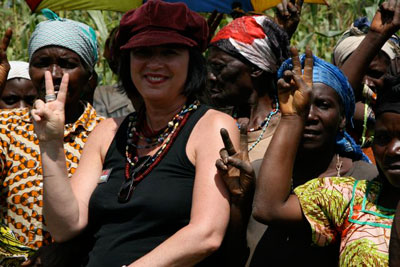
Dear Friends,
It is almost four AM and I am awake in Bukavu. I find myself filled with so many images of the recent days here. I think being in the Congo, one is forced to hold the extreme duality of this century in almost every breath and image. I find myself alternatively believing we are at the beginning of real change and revolution and simultaneously at the end of all possibility.
I am there in Kinshasa where 5 brave women survivors break the silence in front of 500 people – members of Parliament, Senators, activists. There, as they tell their stories, Janet limping to the microphone on a cane as she vividly tells of how they ripped her legs over her head so violently when they raped her they made her permanently handicapped. I listen to the women form words around such cruelty and am simultaneously crushed by the horror and how easily one becomes accustomed to atrocity. How 500 people politely listen to such crimes against women's bodies and do not stand, scream, rush into the streets demanding justice.
In Kinshasa I meet a core of totally empowered and engaged V-Day activists (many men) changing their communities, educating and mobilizing for change. In the same city on the same day, when we address the Parliament, I meet strong empowered women members of government like Eve Bazaiba and Mama Batchu and then there are others who are surprised to hear there is a war still going on in the East.
I see brilliant Congolese actors performing The Vagina Monologues at the Grand Hotel in front of hundreds, singing African songs, dressed in colorful panges. Their performance breaks taboos and frees a discourse that feels like true liberation.
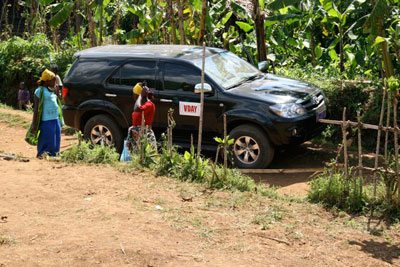
At Heal Africa in Goma we are greeted with hundreds of women and girl survivors dancing with all their hearts and souls. The music is so powerful and I am reminded that women are the future of the DRC. In our meeting, I am told that since the first KIMYA 1 military operation more than 1000 women have been raped a month. I meet 4 girls who are going to school on V-Day scholarships. They are all under 10 years old, and all traumatized by rape.
When they talk about school they are somehow transformed and radiant. Freddie a fierce looking guard at Heal Africa, with huge muscles and intimidating sunglasses decked out in military gear, turns out to have no legs. They were blown off in a bombing of the airport. He does handstands on his knuckles, reminding me that survivors are strong beyond word and everyone has another story.
I dance with the women survivors at Panzi Hospital. All 300 are new since my last visit (it was the same at Heal Africa). Dr Mukwege is working around the clock. One day last week, 50 raped, injured women arrived on the same day, demanding operations. Together, we have excellent discussions, he has such a clear vision of what needs to happen in the Congo, and his love and respect of women and his desire to transform men is inspirational.
The poverty and hunger is so palpable here. People are so poor they jump off a truck each time it needs to stop to be its brakes, where a banana is a days meal, where the arrival of 8 stalks of sugar cane produces a mad riot of children, where the security guard investigating me asks to borrow my pen.
We walk the grounds of City of Joy and the earth is breathtaking. There is so much land and I can feel the future of the place, see the women, the gardens. It is lush and fertile. The physical space we are planning at the City of Joy aims to make women living there feel safe, secure, calm and empowered. We are taking special care to create a feeling of community on the grounds, which will mimic the setting of a typical Congolese village, including a cluster of 10 small structures where women will live and sleep, an orchard, an area for livestock, and many communal places to gather, learn, talk and enjoy each other’s company. A housemother will be responsible for running each of the ten houses and women residing there will be responsible for cleaning, cooking, gardening, and upkeep of the property. All staff will be Congolese.
During my weeks here our vision has really taken shape. We met with many grassroots women’s activists to finalize our plan for the programs. We all agreed that women survivors who are referred to the City of Joy will come from hospitals and NGOs working throughout the region, allowing for a diverse group of 100 women between the ages 14-30 to be served at a time (a period of 4 to 6 months). Candidates will be chosen on their demonstrated leadership abilities and their desire and commitment to lead and take responsibility for their communities.
The program plan we have finalized is innovative and holistic. Women will have access to programming in: group therapy; storytelling; dance; theater; self-defense; comprehensive sexuality education (covering HIV/AIDS, family planning); gardening; public speaking; leadership and advocacy; human rights; ecology and horticulture. We are also very excited that the South Kivu Women's Media Association (know as AFEM), which is lead by celebrated journalist and activist Chouchou Namegabe Nabintu, will run a radio station out of the City of Joy and train women in radio reporting and broadcasting. We are in conversation with a local newspaper about providing the women a monthly space to write about issues important to them.
Another integral part of City of Joy will be community service in the village surrounding the City of Joy grounds and Panzi Hospital. A highlight of the program will be an economic empowerment program—we are currently considering a number of options for creating a City of Joy line of clothing or goods. When women transition out of the City of Joy, we will take measures to stay connected to them and provide them with support, either via solar cell phones we would give them or through informal networks of communication. We are also exploring the feasibility of helping women who leave the City of Joy to set up community centers in their villages as a means of economic empowerment. One idea is to display the products they sell at a crafts market at the City of Joy every three months.
We have meetings with all kinds of local groups and Unicef and begin to plan the campaigns next activities. There will be productions of The Vagina Monologues in various provinces performed by Congolese actors, followed by workshops for men and women on sexuality and sexual violence. Activist training will continue. Dr. Mukwege will speak and lead forums for V-Men in the Congo.
Circumstances are very difficult in the DRC. Often there is no electricity or water. The Internet is sporadic at best. I have a whole new appreciation of Christine, our V-Day Congo and City of Joy Director, and the work she has to do. She is so powerful and so beloved everywhere we go.
We participate in a V-Day/Unicef fora where hundreds come from all over South Kivu. There are excellent discussions and a very brave woman Mastica tells her very disturbing story. The forum lasts three days. I see the survivors who spoke at our last Break The Silence event and they are changed women. They are activists now, very powerful, no longer depressed and they are always together.
I visit the villages. No matter what women are doing, the possibility of rape is always lurking. In one village ten women were kidnapped the week before and not seen again. Women always travel in groups so they can help protect each other.
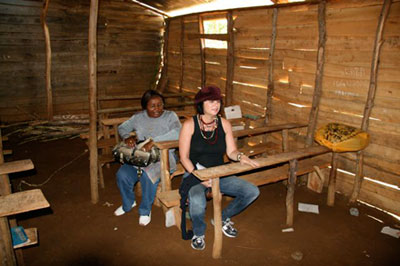
In Miti a village an hour outside of Bukavu, I meet a collective of survivors who have all fled their villages and found each other and have begun to build a new community. There group is called “The One Who has a Small Something Has to Help the Others”. They have literally built a school out of sticks for the 300 orphans, some of whom are children who are products of rape. The children are so hungry. They sing this song for us;
We want the massacres to finish
We lost so many parents
Since we were born we just know war
Every night when we go in our house
We are so afraid to sleep
It's enough
We don't want out parents to suffer anymore
We just want the war to end
The women in this collective believe they are blessed to remain alive so they help everyone they can. The teachers all volunteer. I see this phenomenon everywhere I travel – women survivors finding each other and building a new world.
This is true with the ten-year-old collective AFECOD, as well. Germaine, a powerful grassroots Congolese woman leader, takes us back to the fields where survivors are turning pain to power by planting and honoring the earth. V-Day made a $1000 dollar award to them six months ago and now there are more fields of sweet potatoes and peanuts and corn. The collective has grown to 1000. As I stand in these magnificent green fields I am so moved by these Green Survivor Mamas and see a whole new direction for our movement. We make a ten thousand dollar grant to them so they can grow and prosper. They have many plans to grow and bring more and more survivors into their collective. And they have agreed to train our survivors at City of Joy to grow their own crops.
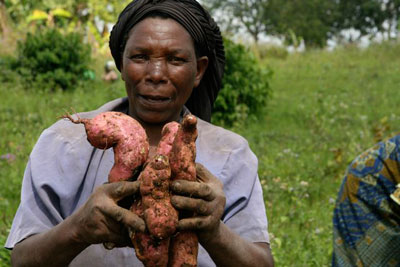
Our last stop is of course the most painful stop of my three weeks in the Congo. It is a small village only one-and-a-half hours outside of Bukavu, yet no one has been here to help the women survivors living there for years. The survivors ask to meet us. We gather in a small shack with one light bulb. There are thirty women and what I think is one older woman. In this shack I see and feel and hear stories that should make the world weak with shame and regret. I think to myself is it possible in the year 2009 in this village, in this shack that these stories could be told? One woman drops her shirt and shows me her stump of an arm which she lost when she was raped by many and then shot, another shows me her missing foot, another shows me the gunshot wounds in her arm. All the women have been raped many times. Some can hardly lift their heads. There were hard rains a few weeks ago and they all lost their homes so they are now living in the road. (V-Day gives them a grant for sheeting for new roofs). There is a 17-year-old girl nursing a baby born of rape. I ask how she feels about the baby and she says: "How can I not love my baby?" The baby is very sick and is getting smaller and smaller every day. Clearly, the baby has AIDS. If it is this bad this close to the city, I am frightened to think what it must be like for women deep into the forests. At the end, the person I think is an older woman speaks and it turns out to be a man. He was once a tailor. His name is Emanuel. The militias broke into his house. They forced him to rape his family, his children and his wife. Then they killed all of them. Then they raped him and forced him to carry things that were heavy. When he didn't move fast enough they cut off his arm. He is the saddest man I have ever seen. He travels only with the women survivors, unable to forgive himself for what he did to his family. This is one shack in one village. There are thousands of these shacks all over Eastern Congo. The women are being destroyed. As Dr. Mukwege says, “this is Genocide. If you destroy all the women the Congolese people will not exist in years to come.”
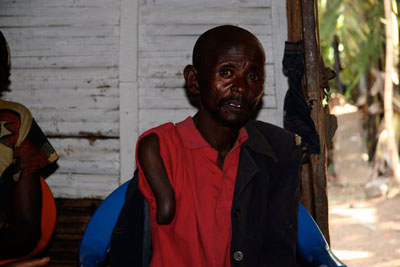
There is this terrible story and then there is the other – the women finding each other mystically, spiritually, bonding, refusing to kill themselves, helping the others with the little they have, breaking the silence, planting the fields, refusing to leave until they are operated on, bringing up orphans and the children born of rape. There are these two stories.
I choose to believe the story of women will be the story that triumphs. It will require all of us. The women of Congo need the world to stop exploiting minerals. They need the war to end so they can walk in the streets and fields and forests, so they can give birth to babies out of love, so they can have their bodies whole and in tact, so they can live
without fear.
Fight for them. Support them. Get more active.
I send you love from Bukavu,
Eve






